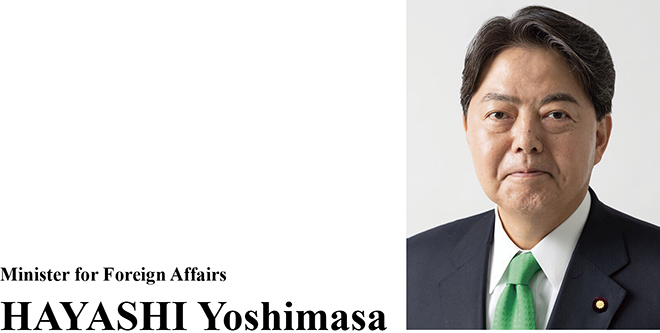Foreword
One year and three months have passed since I was appointed as Minister for Foreign Affairs in November 2021. In February 2022, Russia commenced its aggression against Ukraine. It has caused a large number of casualties and displaced persons, and also caused energy and food crises, which have impacted not only Europe, but the whole world. Japan is not an exception and the lives of Japanese citizens and the business of Japanese companies have been seriously affected.
The international community is currently facing an upheaval of order that is described as the end of the post-Cold War era, and we stand at a historic crossroads. Universal values such as democracy and the rule of law, and the international order, which have until now underpinned the peace and prosperity of the international community, have been exposed to serious challenges. The dissemination and implementation of international rules on development also remains a challenge, and opaque and unfair development finance hinders the sound and sustainable development of some developing countries. The security environment surrounding Japan is also becoming increasingly severe and uncertain. At the same time, we must not halt efforts to address global issues such as the achievement of the UN Sustainable Development Goals (SDGs), climate change, and global health, including infectious diseases control.
While these compound risks threaten the security of each country and human security of each individual, Japan works on diplomatic issues with a determination to fully safeguard its own peace and stability, to fully defend universal values, as well as to contribute to humankind and to take on a leadership role in the international community. In order to promote cooperation toward realization of a “Free and Open Indo-Pacific (FOIP),” to help the world and Japan prosper together, and to enhance the resilience of the international community, it is essential to fundamentally strengthen Japan’s own diplomatic capacity by making more strategic use of ODA, which is one of the most important diplomatic tools.
From this viewpoint, the “Basic Policy on Economic and Fiscal Management and Reform 2022” announced in June 2022 mentioned strengthening diplomacy through the expansion of ODA as one of its pillars. In September, the Ministry of Foreign Affairs (MOFA) announced the revision of the “Development Cooperation Charter,” which articulates the basic policy of Japan’s development cooperation. This is the first revision in eight years, and the details are currently under review. In December, the Advisory Panel proposed the following three basic policies based on the guiding principle of human security: maintaining the international order based on universal values; creating an environment for developing and prospering together with the world; and leading international efforts to address global issues. In order to advance development cooperation in keeping with the times, we will formulate a new Charter during the first half of this year, taking into consideration the Advisory Panel’s proposals and the opinions of a wide range of stakeholders.
In order to maximize the impact of development cooperation and enhance the strategic approach, it is also essential to further strengthen collaboration with domestic and international partners. Cooperation with like-minded countries such as the G7, the Japan-Australia-India-U.S. (QUAD), and with international organizations, have diplomatic significance to promote multilateralism and international cooperation, disseminate and implement international rules on development, and strengthen Japan’s leadership on global issues. All Japan efforts in collaboration with the private sector and civil society are also significant for enhancing the attractiveness of development cooperation that takes advantage of Japan’s strengths.
For more than 65 years, Japan has continued development cooperation with approaches unique to Japan, such as development led by developing countries themselves and efforts focusing on people, while working together hand-in-hand with Japanese companies and civil society. Such Japan’s efforts have earned the trust of developing countries and the international community in promoting diplomacy, and many countries have expressed their gratitude to Japan. We believe that this trust by the world is the driving force for opening up a new frontier for Japanese diplomacy.
In 2023, Japan assumes the G7 Presidency and also starts serving a two-year term as a non-permanent member of the UN Security Council. Japan shall respond to the trust of developing countries, which constitute the majority of the international community, while ensuring its own security and growth. Furthermore, Japan shall lead the international community in responding to the multiple crises facing the world, such as climate change, environmental issues, and global health, with approaches unique to Japan. From a medium- to long-term perspective, promoting development cooperation is an investment in the future of the international community and Japan, in the sense that it helps realize a peaceful and stable society. Japan’s development cooperation is expected to play a greater role than ever before. Japan shall demonstrate further leadership with the understanding and support of Japanese citizens.
March 2023

